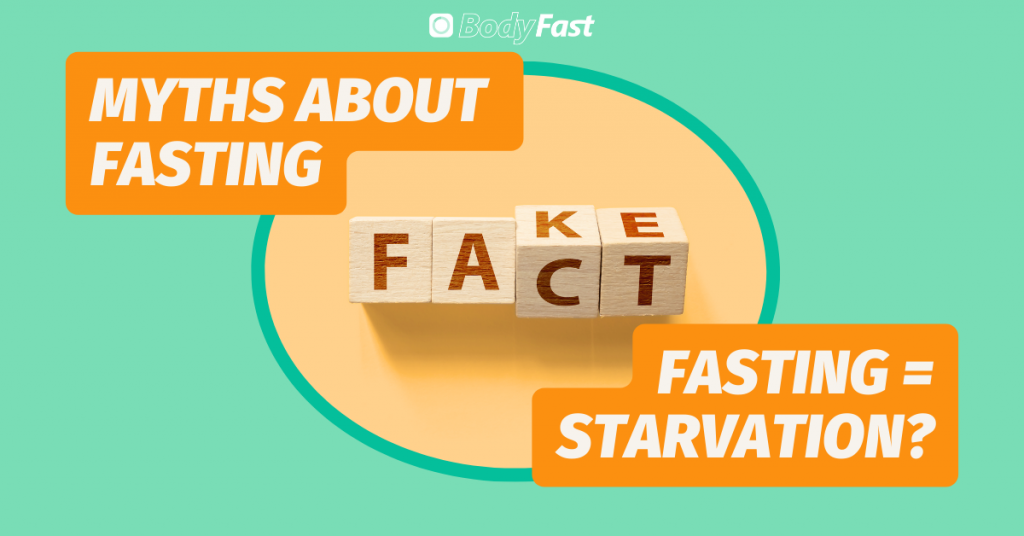”Why are you fasting? You’re starving your body!” – does this prejudice sound familiar to you? We’ve been there! Unfortunately, there are many persistent myths about intermittent fasting.
In this blog post, you’ll get counter-arguments that will convince even the harshest critics. We’ll show you why fasting is far from being a fast-track to starvation but a smart, health-boosting strategy for both your body and mind!
Why fasting ISN’T starvation
Starvation is characterized by a severe lack of essential nutrients, vitamins, and calories over an extended period. This can lead to a wide range of health issues such as hallucinations, a drop in blood pressure or disruptions in heart rhythm.
In contrast to starvation, intermittent fasting is an occasional, planned break in food intake for short time frames, that offers unique benefits to your body.
Here’s a list of the main differences:
Controlled duration
Fasting follows specific time intervals, ensuring that you’re not depriving yourself for extended periods. This prevents the negative effects associated with starvation.
Regular food intake
During your eating periods, you’ll consume a sufficient amount of nutrients to maintain your body’s nutritional balance. Starvation, on the other hand, often means hardly getting any nutrients at all.
Metabolic switch
During fasting, your body switches from using sugar for energy to using its fat stores. This metabolic switch is an essential part of the fasting process which ensures consistent energy supply.
Personal choice
Intermittent fasting is a voluntary practice, allowing you to have full control over when you start and end your fast. Starvation, unfortunately, usually isn’t a choice.
How to safely practice intermittent fasting
To help you get the most out of your fasting – 100% starvation-free 😉 – we’ve gathered the best tips for a safe IF approach:
1. Fuel your body adequately
Make sure you’re consuming enough calories during your eating window to meet your daily energy needs. Intermittent fasting isn’t about calorie restriction; it’s about timing your meals to benefit your body without depriving it.
2. Focus on a balanced nutrition
Focus on a well-balanced diet that includes a mix of macronutrients (proteins, fats, carbs) and micronutrients (vitamins and minerals). This will support your overall health and prevent nutrient deficiencies. You can find delicious recipes in our app.
3. Create fasting windows based on your body’s needs
While intermittent fasting involves periods of fasting, it’s crucial to establish regular eating windows. This consistent nourishment prevents your body from entering starvation mode.
4. Prioritize hydration for your health
Stay hydrated throughout both, your fasting and eating periods. Water is essential for various bodily functions and it’s key for your fasting success. Check out this blog post to see the best tips for an adequate hydration.
5. Listen to your body
Pay close attention to your body’s hunger and fullness signals. If you find yourself excessively hungry or fatigued during your fasting periods, consider adjusting your fasting schedule and/or increasing your calorie intake during eating windows.
This is why fasting isn’t deprivation but an empowerment
On the bottom line – fasting isn’t about depriving your body; it’s about empowering it! It’s a valuable tool, a lifestyle choice that can boost your metabolism, elevate your energy levels, and enhance your overall well-being.
Say goodbye to the myth and welcome a healthier YOU with intermittent fasting!
Get your personal program from the BodyFast Coach – together with delicious recipes tailored to your fasting lifestyle, supportive weekly tasks, daily motivational Coachings, and more.


LOVE MY IF been doing it for 2 years now.. but, all of a sudden I got kind of bored and put on some weight.
How do I get back into it like before? What can I do to give me that excitement once again…
Hello Martha 🤗
To rekindle your excitement, try switching up your fasting routine or incorporating new recipes and activities into your plan. Revisit your initial goals and celebrate your progress to stay motivated.